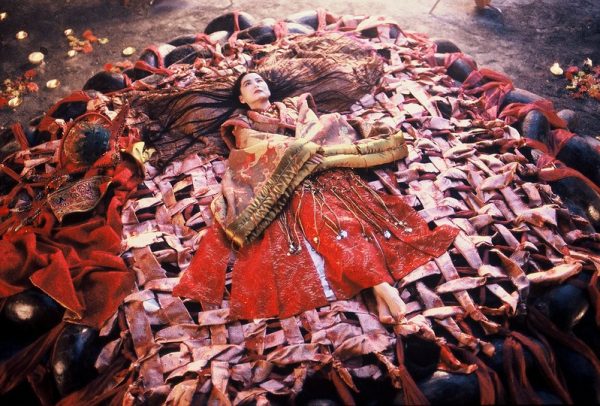If ever there was a genre of film that is so completely outside of the accepted western idea of how film works, it could well be the wuxia. We think we know how historical epics work. We can apply the mechanics of the samurai film to the Hollywood western and find ourselves in familiar territory. Even the strangest East Asian cult films like House or Tetsuo cling to some established tropes of horror and sci-fi. But wuxia are something else. It takes the brain a while to process this weird whirlwind of fantasy, martial-arts, and period drama. It’s the betrayal of physics that does it. These warriors so attuned to a spiritual wavelength they can fly into the trees, dance on the blade of a sword, or take on an army with flailing tendrils of their own hair. Even this curious melange of styles has its own canon, beloved by devotees. But even amongst such films as Dragon Inn, A Touch of Zen, and A Chinese Ghost Story, some titles remain in that nebulous realm of the cult. The stylised collision of silliness and violence that is The Bride With White Hair falls into that category.
Set during the transitional period between the Ming and the Qing dynasties (around 1636-46), The Bride With White Hair centres around the doomed love between ace warriors Cho Yat-Hang (Leslie Cheung) and Lien Ni-Chang (Brigitte Lin). Cho is the chief prospect for the martial traditions of the respected Wudang clan (if that sounds familiar to fans of hip-hop, here’s your wellspring), groomed since childhood for the task, although given to romantic, rebellious notions. Lien is the ‘Wolf Girl’, raised as part of a pack and now an indentured assassin for the evil Mo cult, led by conjoined siblings, both named Gei Mou Soung (Francis Ng, Elaine Lui). The two meet during a battle and recognise each other from an incident in their childhood. They fall for each other instantly, but their respective duties threaten to tear them apart.
Viewers who have come to the wuxia genre after the success of the stately, graceful Crouching Tiger, Hidden Dragon may be surprised by the clattering chaos that characterises ’80s and ’90s films like Zu: Warriors from the Magic Mountain and The Bride With White Hair. But like westerns and samurai films, wuxia can be a broad umbrella encompassing a myriad approaches. Roughly speaking, The Bride With White Hair is to Ang Lee‘s epic what Lady Snowblood would be to Yojimbo, or Django to Once Upon a Time in the West; possessed of plenty artistry on its own terms, but with much more of a pulp sensibility.
Every aspect of The Bride With White Hair is calibrated for maximum richness. Essentially a standard Romeo and Juliet template, there’s a fecund lushness that overpowers any nagging sense of familiarity, or appeals to good taste for that matter. The acting is forceful to say the least, with a silent-movie expressiveness built on the sheer charisma of its beautiful leads and a coordinated feat of double-barrelled lunacy from Ng and Lui as the antagonist(s) (we’ll leave the lazy conflation of deformity with villainy to one side). The fight sequences are full of swift edits and step-printing to mask the relative lack of fighting skills of Cheung and Lin. And what to say of Peter Pau‘s impossibly heady cinematography? The hyper-stylised, bold colours, billowing fog banks, and smouldering close-ups you will find either irresistibly seductive, or a wee bit too much like that uncomfortably orientalist Fry’s Turkish Delight advert from the ’80s.
It is messy, incredibly melodramatic, and more than a little bit camp. However, it doesn’t have quite the same ridiculous, ebullient disregard for narrative and logic that makes a film like the aforementioned Zu: Warriors from the Magic Mountain such a strangely punishing experience. The recognisable tropes of romantic melodrama actually anchor the film enough to a coherent story that one stays orientated, even as the characters are hurled about in tumultuous abandon and gouts of arterial scarlet.
Available on Blu-ray from Mon 9 Nov 2020
